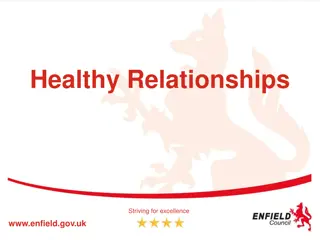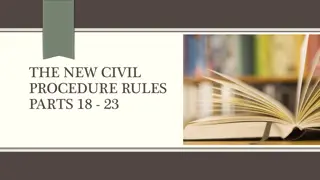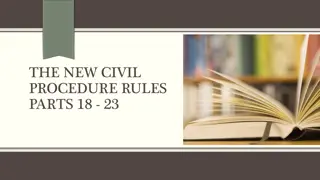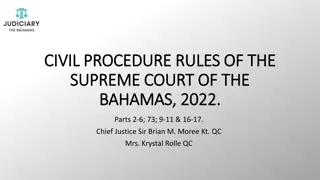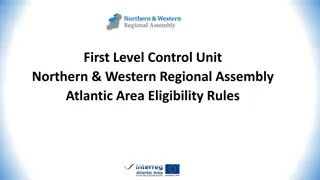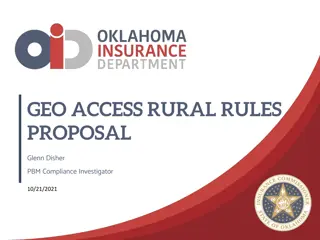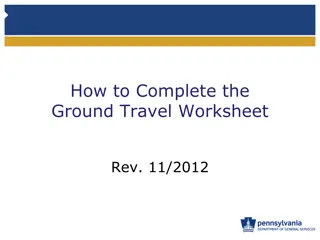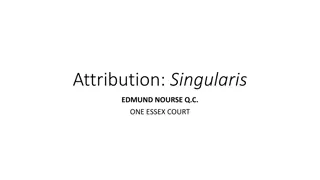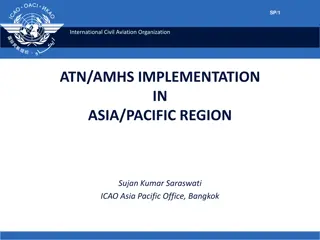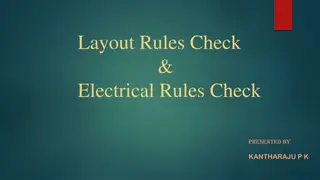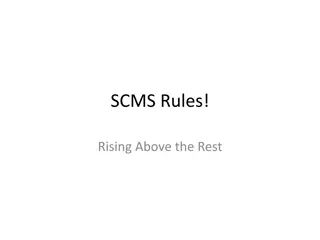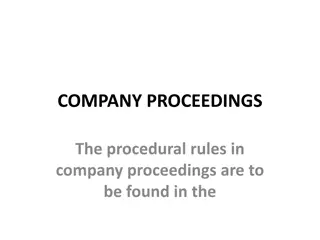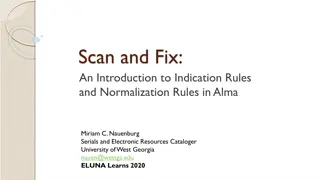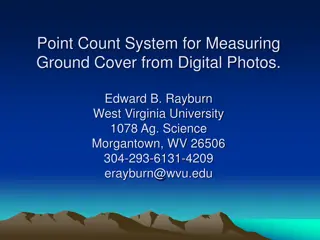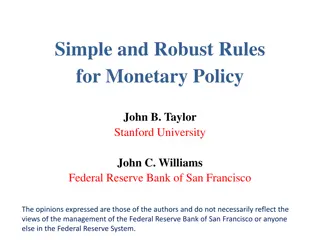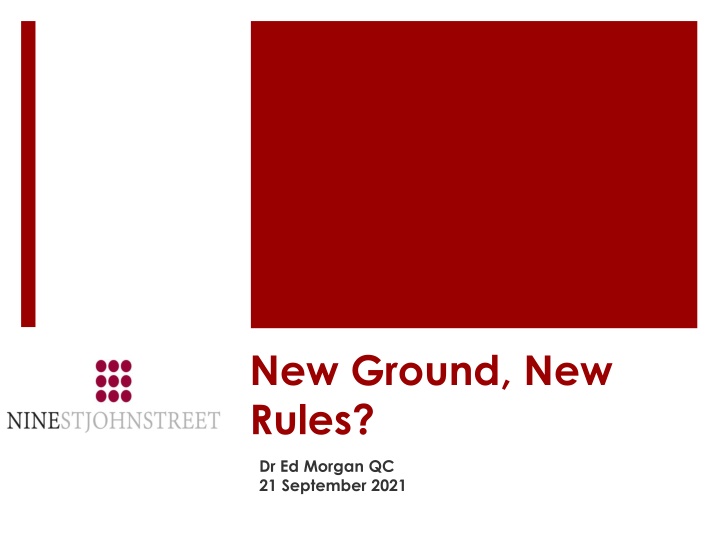
Vulnerability in Civil Justice System - Key Concepts and Solutions
Explore the importance of addressing vulnerable witnesses and parties in civil proceedings, highlighting key concepts like access to justice, transparency, and procedural efficiency. Learn about the challenges faced and the solutions proposed by the Civil Justice Council to ensure fair hearings and proper participation for those with disabilities or vulnerabilities.
Download Presentation

Please find below an Image/Link to download the presentation.
The content on the website is provided AS IS for your information and personal use only. It may not be sold, licensed, or shared on other websites without obtaining consent from the author. If you encounter any issues during the download, it is possible that the publisher has removed the file from their server.
You are allowed to download the files provided on this website for personal or commercial use, subject to the condition that they are used lawfully. All files are the property of their respective owners.
The content on the website is provided AS IS for your information and personal use only. It may not be sold, licensed, or shared on other websites without obtaining consent from the author.
E N D
Presentation Transcript
New Ground, New Rules? Dr Ed Morgan QC 21 September 2021
2 Core Concepts? Access to Justice Transparency Participation Equality of arms Procedural efficiency Proportionality
3 Pre February 2020? European Convention on Human Rights [Art 6] Section 3 and 6 of the Human Rights Act 1998 Equality Act 2010 Jurisdiction specific procedural rules Protected categories (e.g. children, vulnerable adults, or complainants in particular forms of criminal proceedings) Special Measures .
4 The Issue? The Civil Justice Council Vulnerable Witnesses and Parties within Civil Proceedings [February 2020] The issue: Access to Justice, just procedures and fair hearings are essential elements of our justice system to ensure the system works properly such elements need to cater for parties and witnesses, who by reason of mental or physical disability/disorder, impairment of intellectual or social functioning, fear or distress, or other reason, are vulnerable such that their ability to participate in proceedings or to give their best evidence, may be impaired.
5 The Problem? The Civil Justice Council Report: Since 1999, the Civil Procedure Rules allow the use of many of the methods/forms of assistance and protections for vulnerable parties and witnesses used in criminal and family courts. However, there is no specific rule in relation to vulnerable witnesses and parties and the existing rules have been criticised as being passive and inadequate for the purposes of ensuring a sufficiently proactive and consistent approach to enabling the proper participation in civil litigation of those who are, or may become through involvement in the process, vulnerable
6 The CJC Solution? Changes in Procedural Rules Use of questions to identify disability or vulnerability [e.g. ET1] Training for the Judiciary HMCTS guidance re use of intermediaries
7 Judicial Observation? "The ability to tell a coherent, plausible and assured story, embellished with snippets of circumstantial detail and laced with occasional shots of life-like forgetfulness, is very likely to impress any tribunal of fact. But it is also the hallmark of the the ages. [Per Lord Bingham The Business of Judging] confidence trickster down In the light of these considerations, the best approach for a judge to adopt in the commercial case is, in my view, to place little if any reliance at all on witnesses' [per Leggatt J in Gestmin SGPS SA v Credit Suisse (UK) Ltd and Anor [2013] EWHC 3560 (Comm) trial of a This convincingly undermines to my mind the argument that the first instance judges somehow have some numinous exclusive power to assess credibility perfectly. But is oral testimony about an event the best source of evidence about that event? [Mostyn J The Craft of Judging and Legal Reasoning 8 December 2014] This judgment is as short as possible so that the mother and the older children can follow it . [Jackson J in Lancashire CC v M [2016] EWFC 9]
8 Judicial Resource? The Equal Treatment Benchbook Witnesses and parties may be vulnerable in court as a result of various factors, and reasonable adjustments need to be made. Although touching on the wider power to make adjustments, this chapter focuses on the statutory regime in criminal cases for taking specialmeasures for vulnerable witnesses Family courts have increasingly adopted the regime of specialmeasures and certain other courts and tribunals have derived ideas and guidance to adopt within their own general procedures The Civil Justice Council observation: The ETBB is clearly an essential tool for a civil judge. However, it still requires a judge to recognise that an issue may arise [or has arisen] in the case which needs to be addressed .By way of example, mental disability is common and often not visible or visible only in some contexts.. [ 146]
9 ETBB February 2021? Necessary advance planning 31. Ideally courts and tribunals should have systems for identifying at an early stage and before the final hearing / trial whether any adjustments for disability will be required. Where there is a question on the standard claim form for the court in question, this should be checked by judges or case workers at an early stage and follow-up enquiries made where an issue is identified. NB Mind has produced a list of triggers or stressors of which the Court should be aware. These include: noise, interruptions, being asked to concentrate, time pressures, authority figures, questioning, feelings of not being listened to or believed.
10 Advocates Gateway? Established in 2012 Promotion of highest ethical and professional standards Evidence based guidance Toolkits The Advocates Gateway toolkits aim to support early identification of vulnerability in witnesses and defendants in the making of reasonable adjustments so that the justice system is fair. Effective communication is essential in the legal process. The handling and questioning of vulnerable witnesses, and defendants is a specialist skill
11 TAG Toolkits? No 1 - Ground Rule Hearings and Fair Treatment No 5 Planning to question someone with hidden disabilities No 10- Identifying vulnerabilities and making adjustments No 12 General Principles when questioning witnesses and parties No 17 Vulnerable Witnesses and parties in the Civil Courts No 18 Working with traumatized witnesses
12 Case Management? Identification [NB hidden disabilities, or context specific vulnerability] Bespoke Attention preserving flexibility [CJC Report 186] Controlling reception of oral evidence [i.e. ground rules] Current means of assistance Video links, interpreters, Intermediaries, Assessors, Private Hearings, IT facilities
13 Ground Rules? Facilitate participation Secure best evidence It is the duty of the Court to control questioning of a witness and to ensure compliance with the overriding objective [CJC 194] It is now generally accepted that if justice is to be done to the vulnerable witness and also to the accused, a radical departure from the traditional style of advocacy will be necessary. Advocates must adopt to the witness, not the other way round [R v Wills [2011] EWCA Crim 1938] Examples: - Duration of questioning [max of 2 hours] - Questions in writing in advance - Apportioning questions between defendants [Armes v Nottinghamshire CC [2017] UKSC 60]
14 TAG Checklist? Published 1 December 2016 Directed to criminal proceedings Role of Intermediaries in GRH discussions [ 1] Participation of vulnerable defendant [ 2] Fair questioning [ 3] Recurring themes: (i) Intermediary quasi-participant, moderator and aid (ii) Translation style, content and format (iii) Location. - venue, platform, special measures (iv) Questions form, content and duration and timing (v) Court hours rest breaks-
15 GRH Toolkit? 1 December 2016 Support the early identification of vulnerability - advocates should be alert to the risk [ 1.1] The Court s safeguarding responsibility [ 1.2] Judicial control of questioning [Crim PR 3.9(7)] [ 1.3] Where a witness or party has communication needs [ 1.4] GR should be recorded [ 1.5] Questions reduced to writing [ 3] [NB without disclosure to opposing counsel] Special measures and other adjustments [ 4.2] No insistence on right to put one s case [ 5.1] [R v Lubemba [2014] EWCA Crim 2064] GR on duration of questions [ 7]
16 A question of balance? Adjusting communication style [ETBB 67] Judges have a duty to intervene to ensure vulnerable witnesses give evidence as best they can [ETBB 73] In more severe cases, sending questions to the witness in advance [ETB 78] Advocacy and The Vulnerable 20 Principles of Questioning : (i) Vulnerability includes immaturity (ii) Every case is unique (iii) Principles for questioning [ 8-20] (e.g. avoid statements put as questions, pronouns, remembering questions, no directive questions).
17 Strategy? Identifythe Court/Tribunal s case management powers [e.g. CPR/ETR]; Identify and/or authentic the concern identified - Identify the evidential basis for the concern is it well founded/conceded Initiate - Be proactive in protecting your client Initiate - propose procedural safeguards e.g. venue, form of hearing etc [ETBB 49 talks of the potential to conduct a hearing at a person s home] Respond - Are the measures proposed proportionate and fair do they need to be continued, retained, revised or abandoned [ETBB 40] Respond- Can the same result be achieved by other means Resist Excessive judicial control or limitation Resist Judicial conduct of the party s case NB avoid alienation and aggravated damages
18 Challenging Decisions? The statutory limitations on appeals [e.g. s21 of the ETA 1996] The threshold for appeal [CPR Pt 52 and Ladd v Marshall ] Reasonable prospects and case management discretion The rare case of factual challenge: (i) was no evidence to support, (ii) based on a misunderstanding of the evidence, or (iii) which no reasonable judge could have reached, that an appellate tribunal will interfere with it. This can also be justified on grounds of policy (parties should put forward their best case on the facts at trial and not regard the potential to appeal as a second chance),.. (Lord Neuberger in Re B (A Child) (Care Proceedings) [2013 1 WLR 1911)
19 Path of Travel? EAT Rackham v NHS Professionals 2015 UKEAT 20 [adjustments] Shui v University of Manchester and others [2018] ICR 77 J v K (EHRC Intervening) [2019] EWCA Civ 5 [procedural compliance] I start by saying that it was common ground before us, and I would myself emphasise, that where mental ill-health, or indeed any other disability, has contributed to a would-be appellant failing to institute an appeal in time that will always be an important consideration in deciding whether an extension should be granted under r 37(1A) of the 1993 Rules. That is not as a result of the Equality Act 2010, since, as was also common ground, judicial decisions are excluded from the scope of the Act: see para 3 of Sch 3 to the Act. But as a matter of general law the exercise of a judicial discretion must take into account all relevant considerations, and in such a case the party's mental condition or other disability would plainly be a relevant consideration. [underhill LJ]

